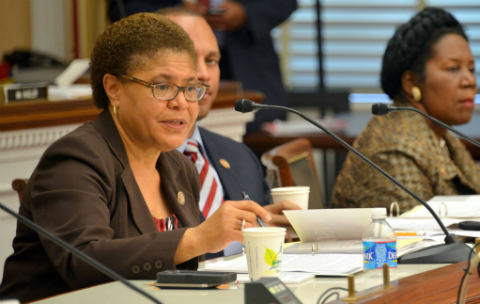EXCLUSIVE INTERVIEW
with United States Congressmember Karen Bass
Democrat representing California’s 37th District,
which includes Los Angeles and Culver City
Twitter: @RepKarenBass
Interview November, 2012. By Lema Abeng & Innocent Chia
First published in DUNIA print magazine, issue 10
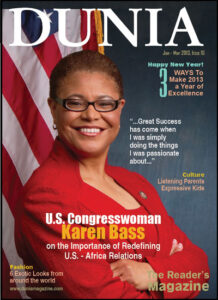 DUNIA Magazine (DM): Congresswoman Karen Bass, your passion for foster kids has not gone unnoticed. Passions are generally triggered by an experience, whether close or distant. What triggered yours?
DUNIA Magazine (DM): Congresswoman Karen Bass, your passion for foster kids has not gone unnoticed. Passions are generally triggered by an experience, whether close or distant. What triggered yours?
Representative Karen Bass (Rep. Karen Bass): My concern for foster care youth goes back many years. I saw the devastating impacts the crack cocaine epidemic was having on my community in Los Angeles. One of those impacts was the placement of several children into the foster care system because their parent’s drug addictions prevented them from providing the proper care. So I always kept them in mind from my days as an activist throughout my time in the California Assembly where I pushed to help children who were about to age out of the system and make sure we made investments into housing facilities for foster care youth. Here in Congress that passion continues. I’ve been working on a bi-partisan basis to introduce transformative legislation to address some of the short comings within our current system. I founded and serve as Co-Chair of the bi-partisan Congressional Caucus on Foster Youth. It’s been a great vehicle to work with so many of my colleagues, Democrats and Republicans, who also share this passion for foster youth.
Have there been parallels between the needs of the Foster system and the work that you do in your Subcommittee on Africa, Global Health and Human Rights?
Rep. Karen Bass: There definitely are parallels. With our foster care system, we are looking at ways to provide better care and services to children who for some reason or another may not have a home, parents or a family to care for them and provide the foundation they need to be successful in life. The same is true for children all over the world who for some reason or another, don’t have that foundation and are in need of parental guidance and a family to love them. So while the root causes may be somewhat different, the fundamental needs of these children whether they be here or Africa are the same. They need parents and families to love them and nurture them to their full potential. In Africa particularly you have children who are orphaned due to HIV and AIDS for example. Those children are certainly in need of parents and a helping hand to give them the best possible opportunity to succeed. Another similarity is human trafficking. Foster care youth in the United States are very susceptible to human trafficking. The same is true in Africa, where children who have lost their parents for one reason or another face many of the same dangers – so there are definitely parallels.
Regarding your Subcommittee, your Subcommittee successfully pushed through the passage of the AGOA in August of 2012. Why is AGOA – which has been a bipartisan highlight since its inception under President Bill Clinton – so important, yet so unknown?
Rep. Karen Bass: Just to clarify, a special provision within AGOA was extended and linked to expiration of the law overall – in 2015. While the Africa subcommittee certainly has interest in AGOA, in this case the provision that was passed into law actually falls under the jurisdiction of the House Ways and Means Committee. AGOA is critically important for many reasons. First it supports jobs across the continent. There are some 300,000 jobs attached to AGOA and many of those are jobs that go to African women. If you count the jobs that are indirectly linked to AGOA that number rapidly approaches one million or more jobs. AGOA is an important tool for economic development on the continent and with that comes the opportunity to really redefine the United States’ relationship with Africa. One of the many things I’ve been working to address in Congress is pushing a dialogue to redefine our relationship with Africa by expanding our focus from aid to trade. Over the last decade, six of the world’s fastest growing economies were in Sub-Saharan Africa. There is huge potential here for engagement that benefits both of the African economies as well as the United States. I think a lot of these facts are unknown to so many people who are stuck in an old and outdated way of thinking about Africa. They are not aware that these opportunities exist or of the success of something like AGOA so many of the accomplishments go unknown. I think it’s one of the reasons why our work to redefine that dialogue on Africa is so important so that people understand the opportunities that exist on the continent.
You traveled to East Africa earlier in 2012. Was that your first visit ever to Africa? Please tell us about that experience.
Rep. Karen Bass: I first visited the continent in 1999 when I took a trip to Ghana. Before visiting, I was deeply involved in the anti-apartheid struggle in the United States and more generally focused on the liberation struggle of African nations as many had or were just fully realizing their newly minted independence. My visit to Ghana was a special time for me and one that I will always cherish. Since joining the U.S. Congress, I have had the great honor to visit several African nations including, South Sudan, Uganda, Kenya, Tanzania, Gabon, Botswana, and Sao Tome. It has been an incredible journey and opportunity to better understand Africa, and U.S.-Africa policy more broadly.
Prior to your first African visit, what were your thoughts about Africa? How did the visit change or reinforce those thoughts?
Rep. Karen Bass: You know some of my first memories of Africa were of African nations being liberated from colonial powers. In Los Angeles where I’m from, my friends and I were strong advocates for an Africa that was free and led by African leaders rather than foreign powers. Earlier this year we observed Africa day – some 50 years since African liberation. As Ranking Member of the Africa subcommittee, I was proud to recognize the tremendous progress that has been made since the 1960.I should add to that in my visits to the continent, to East, West and Southern Africa, I have been awe struck with the tremendous growth that I’ve seen and the desire to maximize growth and development well into Africa’s future. My first visit to Africa really just reinforces a lot of the assumptions I already held and that is Africa is a strong and entrepreneurial place with so much to continue contributing to the world.
There are many African Americans that have been taking the genealogy test to trace their specific origins. It is our understanding that you did yours. Would you be so kind as to share with us what it revealed and what, if anything, it means to you?
Rep. Karen Bass: Well, as you may know, each year the Congressional Black Caucus Foundation convenes their Annual Leadership Conference (ALC). During the 2012 ALC, a session called the Africa Braintrust has been an annual fixture and is a time to discuss and evaluate a wide range of issues regarding the continent. It was at this year’s Africa Braintrust that the Africa Channel helped reveal that my ancestry is rooted in the great people of Cameroon. I was delighted that this “reveal” was presented by the Cameroon Ambassador here in Washington. While I have yet to visit Cameroon – and I plan to do so – it brought a sense of joy to know that I am West African by ancestry. I very much look forward to a sort of homecoming and learning more about Cameroon.
What do you know about this country and have you had the time yet to visit since learning of the results?
Rep. Karen Bass: I have not had a chance to visit Cameroon but I hope to do so in the near future. Why don’t you check in with me after my visit and I’ll tell you all about my trip and my ancestral discovery!
You have been an avid supporter of President Obama. What is your assessment of his first term, especially with regards to minorities that have been expressing a feeling of abandonment?
Rep. Karen Bass: Yes I am an avid supporter of President Obama. But I really have to say that I disagree with the notion that African Americans feel abandoned by President Obama. Let’s not forget President Obama came into office in the midst of the worst recession since the Great Depression. President Clinton said it best at the Democratic Convention when he said that no president including himself could’ve gotten America out of such a deep hole in only four years. Yet despite the historic magnitude of the challenges he inherited and almost unparalled opposition from the Republican Party, this President has made significant headway in improving the lives of African Americans. The Recovery Act President Obama signed kept 1.3 million African Americans out of poverty and extended unemployment insurance for those looking to find work. He has made billions of dollars in investments for education that benefit African Americans, covering everything from $2.5 billion for Historically Black Colleges to $2 billion in competitive grants to expand and improve community college programs where nearly half of all African Americans are enrolled in college. And also on healthcare, the President’s reform legislation is helping millions of African Americans have access to healthcare and other services needed to improve their quality of life. Another accomplishment that isn’t talked about enough is the legislation he signed narrowing the disparity between those convicted of possessing crack cocaine and powdered cocaine – which as you know disproportionately, put African Americans in jail for longer sentences than other groups convicted of the same crime. President Obama came in under dire circumstances yet despite that and with not a lot of cooperation from Republicans, he’s made a great deal of headway on several issues of importance to minority communities.
Tell us where you watched election results on November 6th, 2012? What are your expectations for an Obama second term, especially in terms of your Subcommittee and some of your causes that are precious at heart?
Rep. Karen Bass: I watched the election results from Chicago so it was very exciting because I was there when the President spoke to the nation after securing his second term in office. With four more years I think we have an opportunity to make headway on several key issues. I want to work with the Administration for the successful reauthorization of AGOA in 2015. As I stated earlier, AGOA is a great tool for expanding the dialogue on Africa and maximizing the opportunities that exist on the continent. I think the President will be a strong partner in that. Another cause I’d like to try and tackle with the President’s help is transformative change within the United States’ foster care system. I’ve been traveling the country as a part of the Congressional Caucus on Foster Youth, meeting with key stakeholders and foster youth to develop comprehensive legislation that addresses the shortcomings in our current system. So far we have taken a piecemeal approach when tackling foster care but I’d like to work with the President and my congressional colleagues on a set of comprehensive transformative reforms over the next few years.
Americans and others across the world would define you as a successful person. What has been your roadmap for success and what would you say someone must have to be successful?
Rep. Karen Bass: Well I’d first have to say that I’ll consider myself successful when I have achieved a few things I’ve been working on for quite some time and one of those is transformative change within America’s foster care system and doing everything I can to strengthen the relationship between the United States and Africa. With regards to success, I think it’s important to just lead with your passion. More than building a career, what I have done throughout my life is followed by passion for activism. That passion led me into community organizing and the organization I helped to found, Community Coalition was very successful in addressing several of those community problems I’ve talked about. From there I was approached by several folks in the community about running for the Assembly. The Assembly was a great experience for me but it wasn’t something I sought out. Again people saw my work in doing the things I was passionate about so the opportunity just sort of came to me. The story for how I got to Congress is also very similar. So the theme I’ve noticed in my life is that great success has come when I was simply doing the things I was passionate about to make whatever difference I could. That’s the lesson I would have to offer to anyone and that’s always lead with your passion. But again I’m not done yet. There is lots more to accomplish before I would consider myself successful.
Congressmember Karen Bass Photos
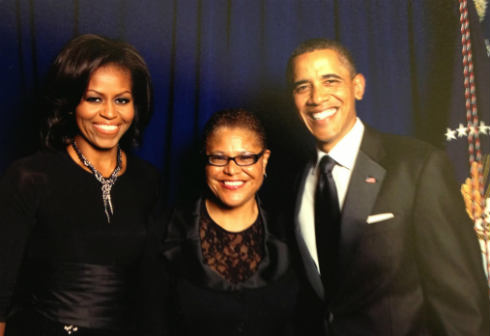
Representative Bass with President Obama and First Lady Michelle Obama. January 17, 2013
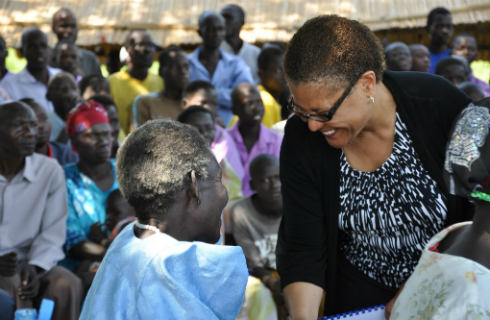
Gulu, Uganda. Congressmember Bass thanks an elderly woman for sharing her story. June, 2012
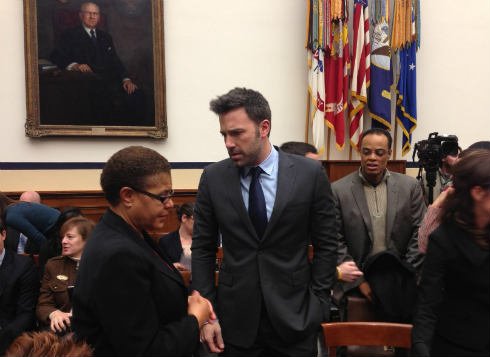
Representative Bass speaks with actor Ben Affleck after House Armed Services Committee hearing on Democratic Republic of Congo. December 19, 2012
READ | Full E-MAGAZINE – Issue 10
(Photos courtesy Congressmember Karen Bass’ Facebook Page)
Lema is on Twitter: @LemaAbeng. Website: www.lemaabeng.com

